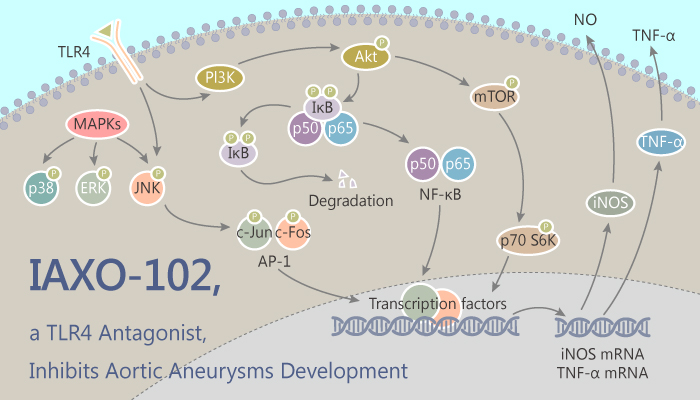Abdominal aortic aneurysm (AAA) is a localized enlargement of the abdominal aorta, larger than normal. It commonly causes no symptoms, but sometimes it has symptoms through pushing on the abdomen. Rupture often causes symptoms. It may bring terrible consequences, such as low blood pressure, loss of consciousness or even death.
Since AAA involves in several biological processes, it is also related to inflammation. Toll like receptors (TLRs) are a group of key proteins in innate immune system. They are single, trans-membrane and non-catalytic. The receptors always exist on sentinel cells. TLRs will activate immune cell responses when microbes breach skin or intestinal tract mucosa. The receptors contain TLR1-10, TLR11, TLR12, and TLR13. Among these members, the last three are not found in humans so far.
TLR4 is an import toll like receptor, and is implicated in vascular inflammation. Regulation of TLR4 may protect against aneurysms.
Today, let’s talk about a potent TLR4 antagonist, IAXO-102.

In cellular assays, IAXO-102 inhibits TLR4 signalling. IAXO-102 (1-10 µM) markedly reduces LPS-stimulated the phosphorylation of MAPK/p65 NF-ΚB, the second messengers in TLR4 signalling. According to such effect, researchers go on explore the potential of IAXO-102. The antagonist also suppresses the production of pro-inflammatory proteins induced by LPS.
In addition, IAXO-102 exhibits excellent activity in vivo. It dramatically reduces increased aortic diameter induced by Angiotensin II at 3 mg/kg. In contrast to the control, IAXO-102 abolishes rupture, decreases aneurysm formation and increases mice survival.
References:
1. Huggins C, et al. Atherosclerosis. 2015 Oct;242(2):563-70.